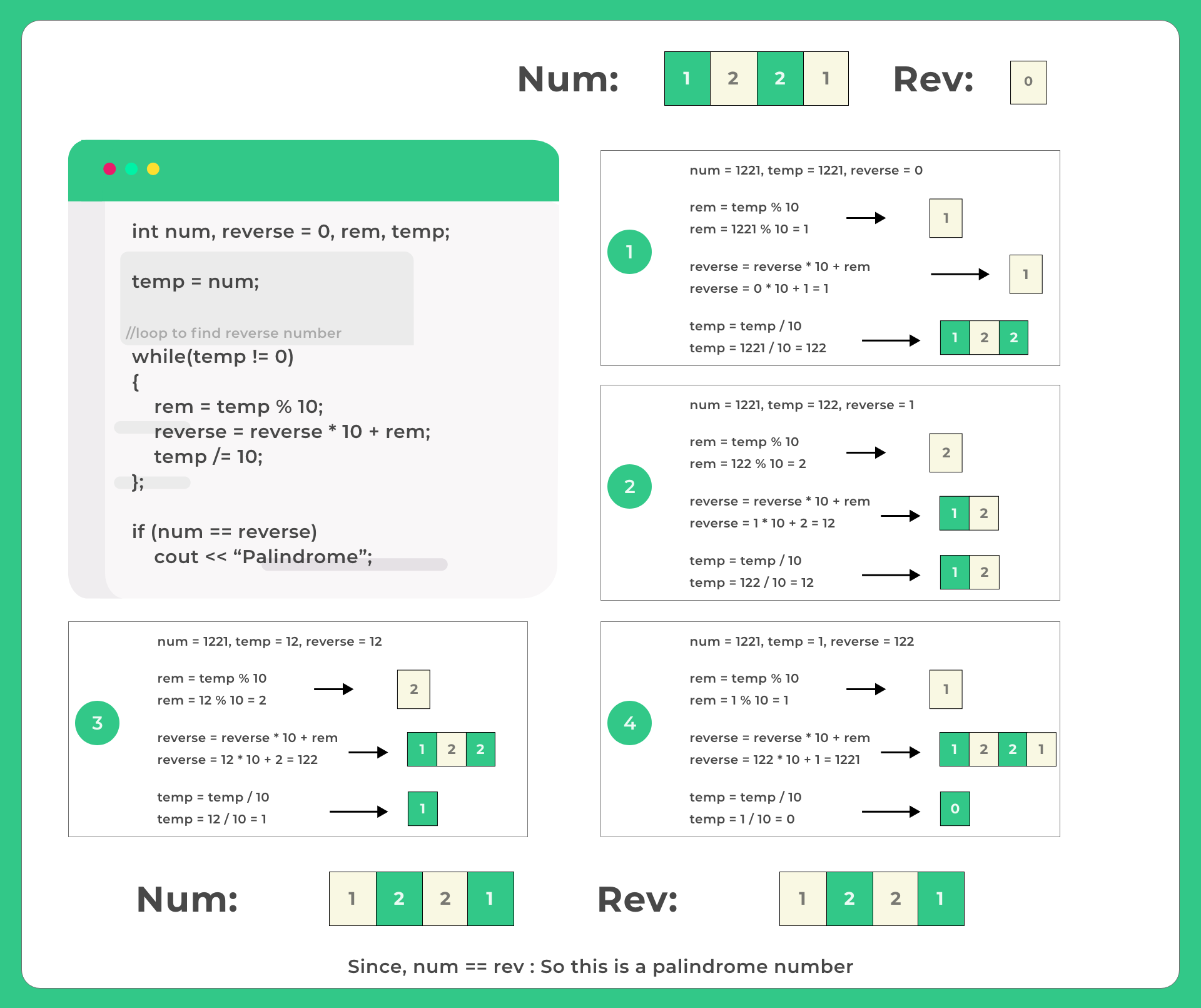Palindrome Program in C
Palindrome Number in C
Via this article, we will learn how to check if a number is palindrome or not using c programming language. We will look at different ways to check Palindrome Number in C.
A palindrome number is a number that is given the same number after reverse.
Example:-
- A number is 123321. If you read number “123321” from reverse order, it is same as “123321”.
- A number is 12121. If we read number “12121” from reverse order ,it is same as 12121. It is also a palindrome number

Methods Discussed
- Method 1: Basic Mathematical Approach
- Method 2: Recursive Approach
Other methods
- Method 3: String approach using for loop
- Method 4: String approach using updated for loop
- Method 5: String approach using Binary search style while loop
- Method 6 : Using external function and running only length/2 iterations
- Method 7 : Using Left and right pointers for string reading
Method 1:
Working for Palindrome Program in C
For an input num
- Take user input in num
- Find the reverse value of num in another variable ‘rev‘
- Check if rev == num

Method 1
// Palindrome program in C
#include<stdio.h>
// Palindrome is a number that is same if read forward/backward
// Ex : 12321
int main ()
{
int num, reverse = 0, rem, temp;
num=11211;
printf("The number is :%d\n",num);
temp = num;
//loop to find reverse number
while(temp != 0)
{
rem = temp % 10;
reverse = reverse * 10 + rem;
temp /= 10;
};
// palindrome if num and reverse are equal
if (num == reverse)
printf("%d is Palindrome\n", num);
else
printf("%d is Not Palindrome\n", num);
}
// Time Complexity : O(N)
// Space Complexity : O(1)
// Where N is number of digits in numOutput:-
The number is: 11211 11211 is Palindrome
Method 2 (Recursive Approach)
This method uses recursion in C
#include<stdio.h>
// Recursive way to find reverse of a number
int getReverse(int num, int rev){
if(num == 0)
return rev;
int rem = num % 10;
rev = rev * 10 + rem;
return getReverse(num / 10, rev);
}
int main ()
{
int num, reverse = 0;
num=12321;
printf("The number is: %d\n",num);
// palindrome if num and reverse are equal
if (num == getReverse(num, reverse))
printf("%d is Palindrome\n", num);
else
printf("%d is Not Palindrome\n", num);
}
// Time Complexity : O(N)
// Space Complexity : O(1)
// Auxilary Space Complexity : O(N)
// Where N are number of digits in a number
Output:-
The number is: 12321
12321 is Palindrome
Other Methods
The below method will work if we have a string input
Method 3
Palindrome Program in C
- For a String of Length: Len
- Run an iterative loop in an iteration of i
- If encounter any index such that arr[i] != arr[len – i -1], then the string is not palindrome
- Otherwise if no condition such found in whole iteration in loop then string is palindrome
#include <stdio.h>
#include <string.h>
int main()
{
char str[10] = "naman";
int i, len, flag = 0;
len = strlen(str);
for (i = 0; i < len; i++)
{
// Checking if string is palindrome or not
if (str[i] != str[len - i - 1]) {
flag = 1;
break;
}
}
if (flag)
printf("%s is not palindrome", str);
else
printf("%s is palindrome", str);
return 0;
}
Output
naman is palindrome
Method 4
This method is same as the above method with two minor differences –
Difference 1
- For loop runs only till len/2 not the whole length of the string
- Since the other half, the string will be the same as the first half. If the string is a palindrome
Difference 2
- We also handle capitalization
- The previous method would have said “Naman” is not palindrome as N is not equal to n
- This method converts whole string into lowercase and thus will say that “Naman” is palindrom
#include <stdio.h>
#include <string.h>
void lowerCase(char str[]){
int i = 0;
while (str[i] != '\0')
{
if (str[i] > 64 && str[i] < 91)
str[i] += 32;
i++;
}
}
int main()
{
char str[10] = "Naman";
int i, len, flag = 0;
lowerCase(str);
len = strlen(str);
// only need to check till half of the array
for (i = 0; i < len / 2; i++)
{
// Checking if string is palindrome or not.
if (str[i] != str[len - i - 1]){
flag++;
break;
}
}
if (flag)
printf("String is not palindrome");
else
printf("String is palindrome");
return 0;
}
Output
String is palindrome
Method 5
This method is the same as the above method. However, instead of for loop, we use a whole loop.
The approach is very similar to Binary search looping
#include <stdio.h>
#include <string.h>
void Lower_case(char str[]) {
int i = 0;
while (str[i] != '\0') {
if (str[i] > 64 && str[i] < 91) str[i] += 32;
i++;
}
}
void CheckPalindrome(char str[])
{
// to mark left most and right most indexes of string
int left = 0;
int right = strlen(str) - 1;
// Keep comparing characters while they are same
// until left and right overlap one another
// inspiration for this approach taken from binary search
while (right > left)
{
if (str[left++] != str[right--]) {
printf("The String %s is not a palindrome", str);
return;
}
}
printf("The String %s is palindrome", str);
}
int main()
{
char str1[50] = "Radar";
Lower_case(str1);
CheckPalindrome(str1);
return 0;
}
Output
The String radar is palindrome
Method 6
We will use an external function and only run the for loop for length/2 iteration
#include <stdio.h>
#include <stdbool.h>
#include <string.h>
// Function to check if a string is a palindrome
bool isPalindrome(const char *str) {
int length = strlen(str);
for (int i = 0; i < length / 2; i++) {
if (str[i] != str[length - 1 - i]) {
return false;
}
}
return true;
}
int main() {
char input[100];
printf("Enter a string: ");
scanf("%s", input);
if (isPalindrome(input)) {
printf("The input is a palindrome.\n");
} else {
printf("The input is not a palindrome.\n");
}
return 0;
}
Output
Enter a string: radar
The input is a palindrome.
Method 7 – Using two reference left and right
We use two variables left and right for the current positions to check if they are same or not.
#include <stdio.h>
#include <stdbool.h>
#include <string.h>
bool isPalindrome(const char *str) {
int left = 0;
int right = strlen(str) - 1;
while (left < right) {
if (str[left] != str[right]) {
return false;
}
left++;
right--;
}
return true;
}
int main() {
char input[100];
printf("Enter a string: ");
scanf("%s", input);
if (isPalindrome(input)) {
printf("The input : %s is a palindrome.\n",&input);
} else {
printf("The input : %s is not a palindrome.\n",&input);
}
return 0;
}
Output
Enter a string: radar
The input : radar is a palindrome.
Prime Course Trailer
Related Banners
Get PrepInsta Prime & get Access to all 200+ courses offered by PrepInsta in One Subscription
- Positive or Negative number: C | C++ | Java | Python
- Even or Odd number: C | C++ | Java | Python
- Sum of First N Natural numbers: C | C++ | Java | Python
- Sum of N natural numbers: C | C++ | Java | Python
- Sum of numbers in a given range: C | C++ | Java | Python
- Greatest of two numbers: C | C++ | Java | Python
- Greatest of the Three numbers: C | C++ | Java | Python
- Leap year or not: C | C++ | Java | Python
- Prime number: C | C++ | Java | Python
- Prime number within a given range: C | C++ | Java | Python
- Sum of digits of a number: C | C++ | Java | Python
- Reverse of a number : C | C++ | Java | Python
- Palindrome number: C | C++ | Java | Python
- Armstrong number : C | C++ | Java | Python
- Armstrong number in a given range : C | C++ | Java | Python
- Fibonacci Series upto nth term : C | C++ | Java | Python
- Find the Nth Term of the Fibonacci Series : C | C++ | Java | Python
- Factorial of a number : C | C++ | Java | Python
- Power of a number : C | C++ | Java | Python
- Factor of a number : C | C++ | Java | Python
- Strong number : C | C++ | Java | Python
- Perfect number : C | C++ | Java | Python
- Automorphic number : C | C++ | Java | Python
- Harshad number : C | C++ | Java | Python
- Abundant number : C| C++ | Java | Python
- Friendly pair : C | C++ | Java | Python






Login/Signup to comment